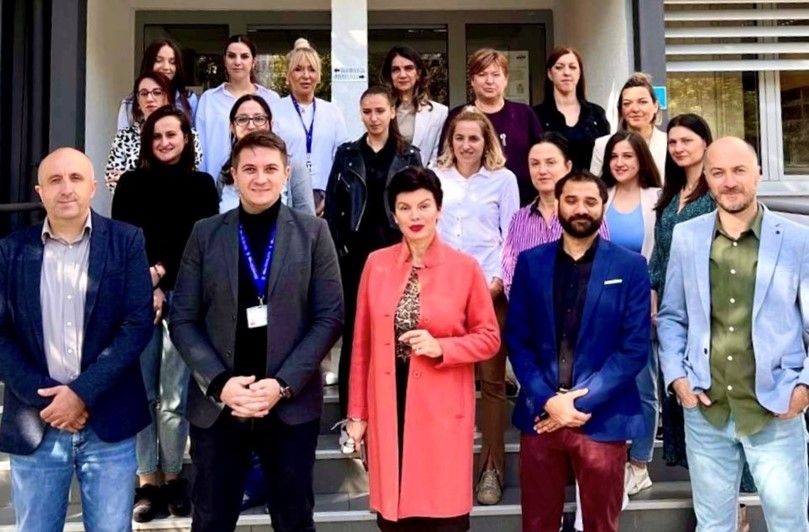REPORT 2022 - 2023
Epigraph:
Author:
- Home
- Executive overview
- Working together
- Impact on the Ground
WHO Region:Country, Territory or Area:Filter search results




- Countries enabled to provide high-quality, people-centred health services, based on primary health care strategies and comprehensive essential service packages
Introducing HPV vaccines for a cervical-cancer free generation in Montenegro
Cervical cancer is the fourth most common cancer in women. It is caused by persistent infection with a virus commonly transmitted through sexual contact called human papillomavirus (HPV). According to WHO’s estimates, Montenegro has the highest rates of cervical cancer in Europe. In 2020, 26.2* women developed cervical cancer and 10.5 women died from the disease for every 100 000 women in the country [1]. Cervical cancer is preventable through vaccination and screening, but while the first HPV vaccine was introduced in countries in 2006, HPV vaccines still remained unavailable in Montenegro in early 2022. One of the four vaccines currently prequalified by WHO against HPV is the 9-valent HPV vaccine. It protects against nine types of HPV and approximately 90% of cervical cancers. To enable its launch in Montenegro, WHO Country Office mobilised resources for planning and preparation. Introduced for 9-year-old girls in September 2022, the 9-valent HPV vaccine had covered 13.07% of the target population by mid-November 2022. HPV vaccine is expected to drastically reduce cervical cancer morbidity and mortality in Montenegro within a generation.
How did Montenegro, with the support of the WHO Secretariat, achieve this?
To pave the way for HPV vaccine, a comprehensive systems strengthening approach was conducted. WHO Montenegro provided technical and financial support to organize and implement government meetings and engagements designed to strengthen policy, planning, and technical capacity. At the highest level, the Prime Minister of Montenegro committed to global roadmaps that aligned the country’s cancer control strategy with WHO’s Roadmap for Health and Well-being in the Western Balkans, 2021-2025 and WHO’s European Programme of work, 2020-2025, creating an overarching policy environment that enabled HPV vaccination.
The government of Montenegro had originally planned to launch an HPV vaccination programme in 2020, but the COVID-19 pandemic severely limited the resources available for strategic thinking and action on non-COVID-19 health issues. As a result, plans for the HPV vaccination were put on hold, and HPV screening programmes were either suspended or considerably affected, putting thousands of women at heightened risk of cervical cancer.

Health Care Workers attend a WHO Montenegro training on effective communication on HPV vaccination.
Photo credit: WHO Montenegro.
After the most critical phase of the COVID-19 pandemic was over, WHO catalysed HPV vaccination by mobilising resources for planning and preparation. With a shortage in resources, the government had only secured a limited number of vaccines meaning that the vaccination plan had to be revised. In order to be a success, the plan had to be favoured by all stakeholders. A WHO Montenegro expert, with technical inputs from two WHO Regional Office and five WHO headquarters technical experts, collaborated with counterparts in the Ministry of Health (MOH) to organize national stakeholder consultations around HPV immunisation. Parents, schools, and institutions across Montenegro were consulted and a draft national action plan was developed. In June 2022, WHO facilitated a multisectoral national dialogue on HPV vaccination. The draft national action plan was presented to attendees including the Minister of Health and Minister of Education, and consensus was generated on HPV vaccine introduction. With the problem of cervical cancer at the forefront, the MOH also decided to resume cervical cancer screening programmes in late 2022. Input from the country’s National Immunization Technical Advisory Group (NITAG) was crucial in driving the process forward. WHO had invested in strengthening NITAGs in Montenegro and other middle-income countries of the WHO European region for many years through training, technical support, and peer-to-peer learning. This included a 2019 training held in Montenegro for NITAG representatives from nine middle-income countries. To build sufficient technical capacity for vaccine administration at the subnational level, in October 2022, WHO trained 35 trainers from the MOH and other institutions.
The circulation of false or misleading information or infodemic in Montenegro was boosted by the COVID-19 pandemic, contributing to heightened vaccine hesitancy and lack of trust in health authorities. There was a risk that HPV vaccine hesitancy would be further intensified given that HPV virus is sexually transmitted, and HPV vaccine is ideally administered before the onset of sexual activity. To ensure uptake of the vaccines, it was necessary to ensure that parents understood the need for the vaccine as a proven intervention for cancer control. A communications expert from the WHO Regional Office created messages tailored for Montenegro’s cultural context, based on the data collected during the stakeholder consultation.
“The COVID-19 pandemic demonstrated that effective communication is a pillar of a strong response. Clear communication helps to counter any myths or misunderstandings, as well as build understanding and trust. The same is true for the HPV vaccine - to have a successful vaccination campaign, effective communication between healthcare providers and patients is essential”
- Dr sci med. Mina Brajovic, Head of WHO Montenegro
On September 26, 2022, the HPV vaccine was rolled out in the country, targeted towards 9-year-old girls. The vaccine is expected to dramatically reduce the cervical cancer morbidity and mortality within a generation. By mid-November 2022, 654 doses had been administered, covering 13.07 percent of the target population. On October 28, 2022, WHO met with the National Health Parliamentary Committee to discuss issues related to health and well-being, and a political declaration on Universal Health Coverage was adopted. WHO continues to work with the government of Montenegro to strengthen HPV vaccination programmes. One of the major strengths of the approach taken so far has been the use of local instead of international experts, which has led to increased ownership, commitment, and institutional capacity that is likely to be sustained into the future.
* age-standardized estimate
- Countries enabled to provide high-quality, people-centred health services, based on primary health care strategies and comprehensive essential service packages
